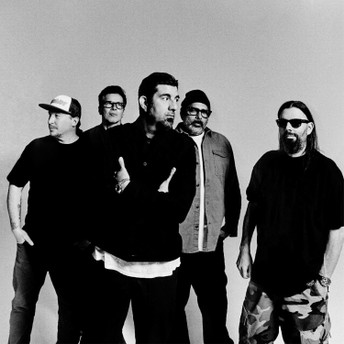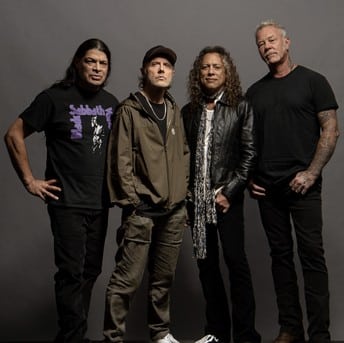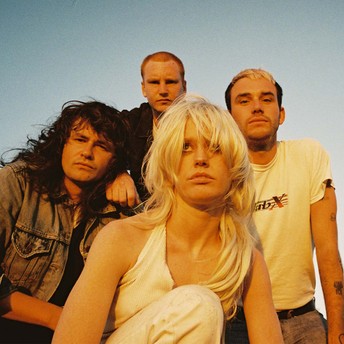Rock
Page: 4

Trending on Billboard As we learned this weekend during his stint hosting Saturday Night Live, The Running Man star Glen Powell contains multitudes. In the promos for Saturday’s (Nov. 15) episode Powell showed off his considerable dancing skills, and during the episode he proved he can handle accents, suit up as a member of the […]
Trending on Billboard
Deftones will return to Australia and New Zealand in 2026 for their first arena tour in nearly a decade, bringing Interpol and Ecca Vandal along for the ride.
The alt-rock band will hit the region in May for a run of five arena shows. The tour kicks off with back-to-back nights at Sydney’s Qudos Bank Arena on May 2–3, then heads to Brisbane Entertainment Centre on May 6 and Melbourne’s Rod Laver Arena on May 9–10, before wrapping at Auckland’s Spark Arena on May 13.
Explore
See latest videos, charts and news
It marks Deftones’ first Australia and New Zealand tour in almost 10 years, underlining how rare a full-scale run from the band has become in the region. All shows will feature Interpol as special guests, with Melbourne artist Ecca Vandal opening.
Interpol’s inclusion brings a stack of indie-rock staples — from 2000s breakthrough “Obstacle 1” and “Evil” to songs from more recent albums — while Ecca Vandal has earned a reputation at home for fusing punk, hip-hop and electronic influences into high-energy sets.
The tour comes on the heels of Private Music, Deftones’ 10th studio album, released earlier this year. The set debuted at No. 5 on the Billboard 200 and bowed at No. 1 on Billboard’s Top Rock & Alternative Albums chart, according to Billboard’s Chart Beat coverage, giving the band another top-tier rock debut after Diamond Eyes, Gore and Ohms all opened in the top 10.
Private Music also extended their streak on the Top Hard Rock Albums chart, where the band has now logged multiple No. 1 entries. Across their career, Deftones have become one of heavy music’s most enduring crossover acts, with 2000’s White Pony earning a Grammy win and later albums like Diamond Eyes (No. 6), Koi No Yokan (No. 11), Gore (No. 2) and Ohms (No. 5) all landing high on the Billboard 200.
The general on-sale tickets go live Nov. 21, with various presales — including artist, promoter and venue offers — rolling out earlier that week.
Deftones 2026 Australia & New Zealand Tour DatesWith Interpol and Ecca Vandal
May 2 – Sydney, Qudos Bank Arena
May 3 – Sydney, Qudos Bank Arena
May 6 – Brisbane, Brisbane Entertainment Centre
May 9 – Melbourne, Rod Laver Arena
May 10 – Melbourne, Rod Laver Arena
May 13 – Auckland, Spark Arena
Trending on Billboard Metallica closed out the Australian leg of their M72 World Tour with a tribute to two of the country’s most influential rock acts, performing covers of AC/DC and Rose Tattoo during their Nov. 15 concert at Sydney’s Accor Stadium. Explore See latest videos, charts and news The gesture came during the band’s […]
Trending on Billboard
Sharon Osbourne is pushing back against an attempt to release early Black Sabbath recordings, publicly challenging former band manager Jim Simpson after he issued a press release claiming legal ownership of the tapes.
Explore
See latest videos, charts and news
The dispute, which escalated over the weekend, comes months after the death of her husband, founding Black Sabbath frontman Ozzy Osbourne.
Simpson, who managed the group in their earliest days, announced on Nov. 14 that he intends to release a collection of 1969 demos recorded before the band adopted the Black Sabbath name. The material, titled Earth: The Legendary Lost Tapes, was initially expected for release in July. The project has yet to materialize, but Simpson maintains he has the right to distribute the recordings.
Sharon publicly disputed those claims in a detailed Instagram post shared on Saturday (Nov. 15). Her post included screenshots of a July 2 email she says she sent to Simpson, warning him against moving forward without the band’s approval.
“As you know, the Band do not want these tapes released, not least as they haven’t heard them despite you saying you would provide copies long ago,” she wrote. “You know that, as a band, Black Sabbath don’t take things lying down and you can be assured that if you go ahead with this against the Band’s wishes we will take any action where their rights are infringed, both here and in America.”
The demos in question feature the band’s original lineup—Ozzy Osbourne, Tony Iommi, Geezer Butler and Bill Ward—during the brief period when they performed under the name Earth. While recordings from this era have long been of interest to collectors, the group has historically kept tight control over their early catalog and archival releases.
The dispute adds to a high-profile week for the Osbourne family. Earlier in the week, Sharon and her children Kelly and Jack Osbourne publicly criticized Roger Waters on The Osbournes Podcast after the Pink Floyd co-founder made disparaging comments about Ozzy in an interview with The Independent Ink. Sharon responded by calling Waters “one of the most twisted, sick individuals I’ve come across in years.”
For now, Simpson’s proposed release of Earth: The Legendary Lost Tapes appears stalled, but Sharon’s post signals the band’s intention to challenge any distribution that doesn’t involve Black Sabbath’s approval. With legal questions unresolved and no release date announced, the future of the recordings remains unclear.
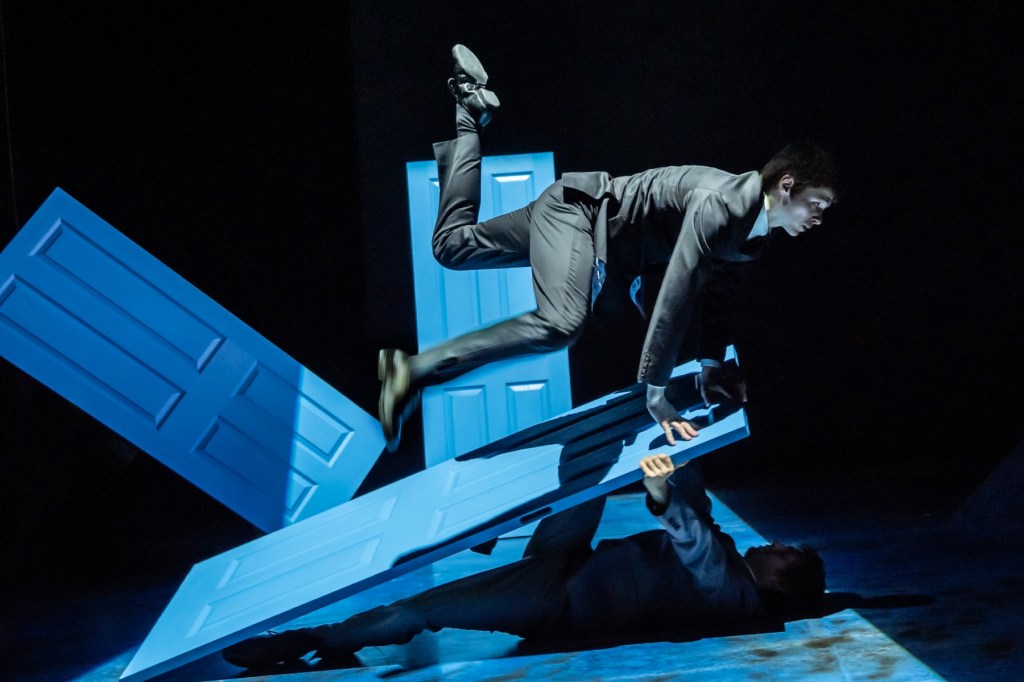
Trending on Billboard
After 61 years of smashing guitars and raising the bar on rock music as an art form, The Who wrapped up their farewell tour six weeks ago in California. But even if the song is over, Pete Townshend is far from finished exploring the creative opportunities presented by the band’s sprawling catalog.
On Friday (Nov. 14), Townshend brought a ballet production of the band’s acclaimed 1973 rock opera, Quadrophenia, to the New York City Center in Manhattan. Directed by Rob Ashford and soundtracked by an orchestral version of the double-album arranged by Rachel Fuller, Quadrophenia, A Rock Ballet—which previously played in London as Quadrophenia, A Mod Ballet—made its Stateside debut. The show boasts a remarkably talented cast (including Ansel Elgort as the bare-chested, guitar-bashing Godfather) who deftly split the difference between stunning dance moves and the expressive yet subtle dramatics this story–about a young man struggling to find his place in the world while clashing with friends, family and himself–demands.
Lead performer Paris Fitzpatrick as Jimmy was revelatory, especially in the final scene where he writhes and spins through a near-suicidal emotional breakdown on a cliff overlooking a raging sea. (When it comes to the Who’s rock operas, Tommy, for all its virtues, is campy and outrageous, while Quadrophenia feels gritty and grounded.) Aside from the orchestral score—which includes two full-on rock detours, “My Generation” and “I Can’t Explain,” era-appropriate Who tunes not present on the 1973 LP—Paul Smith’s costume designs for mods, rockers, British soldiers and bellhops are a delight.
But what really makes Quadrophenia, A Rock Ballet land on the right foot is the choreography. A balletic interpretation of a ‘70s rock opera could go astray or painfully wrong in so many ways, yet choreographer Paul Roberts managed to convey the nervous thrills and impotent frustrations of youth with movements that are frenetic yet graceful, jaw-dropping but never showy. Jimmy’s fantasy about a bisexual three-way was a standout moment, marvelously expressing the potent cocktail of erotic longing and societal shame that accompanies adolescence.
Tragically, Roberts, who was also a frequent collaborator of Harry Styles, died of cancer on Sept. 26 at the age of 52. After several bows from the cast, Townshend—who also appears during the show as a guitar-strumming elder statesman (no, Pete doesn’t plié or jeté)—came out to a standing ovation and said a few words about his late collaborator.
“He’s not with us anymore,” Townshend said, dedicating the show to Roberts. “We worked right through to the end of the show in rehearsals and sessions in Sadler’s Wells and London. Then he went off to sadly pass away from cancer. This show, hopefully, we brought it—I brought it to New York out of my own pocket,” he said to appreciative applause. “You know how I feel about the U.S. of A and, in particular, this city. I really wanted to bring it here for him, his husband Phil (Griffin) and everybody in this company. It’s a British company and we brought some of our crew here to New York. It’s not the usual thing and I’m so grateful to all the unions for helping this happen. Thanks for supporting us here.”
Following the show, Townshend joined Elgort, Fitzpatrick and the rest of the cast and crew for tapas, drinks and even a mini The Fault in Our Stars reunion (Shailene Woodley came out to support her former co-star) at the venue’s VIP lounge.
Quadrophenia, A Rock Ballet wraps its New York City Center run on Sunday (Nov. 16), but hopefully this won’t be the last time it graces Stateside stages. While it’s far different from the recent (also excellent) Broadway revival of The Who’s Tommy, both productions demonstrate that the Who’s catalog remains fascinating fodder for a variety of art forms.
Trending on Billboard The surviving members of KISS paid tribute to their late bandmate Ace Frehley during the opening performance of their three-day KISS Kruise: Landlocked in Vegas on Friday (Nov. 14). Before launching into the “unmasked” set, Paul Stanley shared heartfelt words about the late Spaceman, who died at age 74 in October. “Obviously, […]
Trending on Billboard
Amyl and The Sniffers turned a last-minute cancellation into an unforgettable night for Melbourne’s live-music community on Friday, after their free all-ages show at Federation Square was shut down minutes before they were due to take the stage.
Explore
See latest videos, charts and news
The Aussie rockers, who had been set for a triumphant hometown performance, redirected their entire AU$5,000 performance fee to seven local venues — a gesture that quickly grew into a AU$35,000 bar tab shared across some of the city’s most beloved rooms.
According to ABC Australia, the gig was halted after multiple breaches of the security barrier raised concerns about crowd safety. The Melbourne Arts Precinct Corporation said the decision “wasn’t made lightly,” citing risks to the audience, staff, and the band. Fans watching the livestream were stunned as the plug was pulled just eight minutes before showtime.
Rather than let the night end there, frontwoman Amy Taylor posted a video explaining the cancellation before announcing the band would give the money back to local venues that helped launch their career.
“Have a drink on us,” Taylor said in the video posted to social media over the weekend, which has since clocked more than 1 million views. “Just have some fun tonight.”
Tabs were immediately placed at local haunts The Tote, The Curtin, The Old Bar, Labour in Vain, Hell’s Kitchen, Last Chance Rock & Roll Bar, and Cherry Bar, where fans flocked from across the city after the news spread on social media. Several venues reported packed rooms, lines down the street, and tabs running dry within hours.
The moment arrives during one of the biggest years of the band’s career. Their 2024 album Cartoon Darkness debuted at No. 2 on the ARIA Albums Chart and later landed in the U.K. top 10. It also collected major honors at the 2025 AIR Awards, including Independent Album of the Year and Best Independent Punk Album or EP. The band is up for multiple ARIA Awards this year — including Album of the Year and Best Group — marking a new peak in their national profile.
Their international momentum has accelerated, too. Amyl and The Sniffers earned a Grammy nomination earlier in 2025 and are nominated at the Brit Awards for International Group of the Year. They also joined AC/DC for a run of Australian stadium dates in November, cementing a milestone for a band that cut its teeth in the same small rooms they helped support on Friday night.
Friday’s bar-tab blowout underscored the deep roots Amyl and The Sniffers maintain in Melbourne’s grassroots scene, even as their profile accelerates worldwide. For many fans who raced between venues to claim a drink, the night became an instant chapter in the city’s music mythology — a chaotic, communal celebration born from a disappointment that could have easily overshadowed a landmark homecoming.

Trending on Billboard Whitesnake‘s David Coverdale is calling it quits at 74-years-old, and announced he’s done with music. In a caption-less video posted on Instagram on Thursday (Nov. 13), Coverdale sat sipping a glass of wine as he delivered the unfortunate news that he was retiring. “Ladies and gentlemen, boys and girls, brothers and sisters […]
A recently announced Limp Bizkit show in Tallinn, Estonia has been canceled, reportedly due to frontman Fred Durst’s resurfaced comments praising Russian president Vladimir Putin. According to Estonia’s ERR news agency, the show planned for May 31 at Unibet Arena was called off by promoter the Baltic Live Agency (BLA), which announced on Thursday (Nov. 13), “we inform you that due to circumstances beyond the organizer’s control, the Limp Bizkit concert planned for May 31, 2026 is canceled. Our apologies!”
Explore
See latest videos, charts and news
Ticket pre-sales for the show announced on Nov. 7 were set to begin on Monday (Nov. 10) but were reportedly postponed. The announcement of the gig from the newly resurgent nu-metal band reportedly sparked concern in Estonia — which declared independence from former occupier Russia in 1991 — due to previous comments from Durst supporting Russia’s military campaigns.
Specifically, the site reported that the concerns were tied to Durst holding up a sign in 2015 that reportedly read “Crimea=Russia” and “welcome” after the Russian military annexation of Crimea in 2014. After the show was announced last week, ERR reported that the nation’s Ministry of Foreign Affairs said there was no place in Estonia for support of aggressor state Russia.
“Estonia supports Ukraine’s territorial integrity and the principle that every last centimeter of Ukrainian territory belongs to Ukraine,” ministry media adviser Brita Kikkas told ERR. Foreign Affairs minister Margus Tsahkna added, “My position is clear, and I will repeat it: Russia is the aggressor, and Crimea is occupied by Russia. Those who justify Russia’s aggression and the occupation of a neighboring country are not welcome in Estonia. They have no place on Estonian stages and should not be earning income here.”
At press time, spokespeople for the band and the promoter had not returned Billboard‘s request for comment. In addition, the show is not listed on the group’s official tour routing and no longer appears on the site for the Arena; attempts to purchase tickets through Ticketmaster takes fans to an error page reading “the page you requested was not found.”
Promoter BLA told ERR that it was aware of Durst’s sign and that the only explanation was that “at the time (until 2019), Fred Durst was married to a Russian Crimean woman and evidently living in a distorted information bubble.” TMZ reported in 2018 that Durst filed for divorce from his third wife, Ukrainian makeup artist Kseniya Beryazina Durst, after six years.
Durst was reportedly banned from entering Ukraine — which has been at war with Russia since Putin’s forces launched an unprovoked invasion in Feb. 2022 — for five years in 2015 after holding up the abovementioned sign and reportedly expressing interest in buying a house in Crimea a year after Russia’s 2014 annexation of the peninsula widely recognized as part of Ukraine. The singer had earlier claimed that he planned to move to Crimea to produce film and TV content there.
ERR also reported that following Russia’s annexation of the Crimean peninsula, Durst praised Russian dictator Putin, calling him a “great guy with clear moral principles and a nice person.” In 2023 the band dropped a video for “Out of Style,” in which Durst was deepfaked to appear as Putin, while DJ Lethal was mocked-up as Ukrainian president Volodymyr Zelenskyy and guitarist Wes Borland portrayed a smiling President Biden.
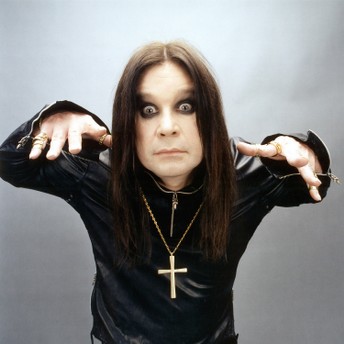
Trending on Billboard
It shouldn’t come as a surprise, but none of the artists who performed at Ozzy Osbourne‘s all-star final Back to the Beginning gig this summer were paid to be there. They did it for the love of the game, and their love of the late metal icon.
Explore
See latest videos, charts and news
Wife/manager Sharon Osbourne revealed the generosity of Ozzy’s peers in this week’s episode of The Osbournes podcast, the family’s first sit-down chat since Ozzy’s death on July 22 at 76 years old, just weeks after the historic gig. “We paid the cost of bringing everybody in, everybody out, accommodation, everything,” said Sharon about the all-day July 5 gig at Villa Park in Ozzy’s hometown of Birmingham, England that featured sets from Metallica, Guns N’ Roses, Slayer, Pantera, Alice in Chains Anthrax as well solo and Black Sabbath sets featuring Ozzy. “[And] no one got paid. Nobody asked for a penny. They gave their time, their efforts, everything for free. People were just, oh God, so generous.”
Sharon also clarified reports about how much the show raised for charity based on what the family said were erroneously inflated figures provided by the show’s musical director, Rage Against the Machine guitarist Tom Morello, in an Instagram post in which he claimed it would donate around $190 million to charities including the Birmingham Children’s Hospital, Acorn Children’s Hospital and Cure Parkinson’s.
Son Jack said there was an “awful lot of bulls–t that went out” about how much the concert raised for charity. Veteran manager Sharon added, “If one show could have raised… I mean, it was up to, like $190 million. It’s, like, any artist, just do one big show, film it and you can retire just on one show. No, it was nowhere near, and I wish that it was, but we are living in reality, in the real world.”
Sharon revealed that the show raised around $11 million for charity given the enormous cost of flying everyone in and out, putting them up and mounting the ambitious show that will be the subject of the upcoming 100-minute concert film Back to the Beginning: Ozzy’s Final Bow, which is slated for theatrical release early next year.
Watch the Osbournes discuss the generosity of the Back to the Beginning participants below.

 State Champ Radio
State Champ Radio 